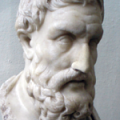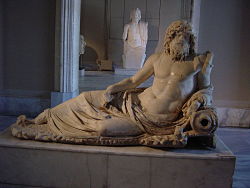57 - Nothing to Fear: Epicureans on Death and the Gods
Peter considers Epicurus’ attempt to dispel the fear of death and the gods, and along the way looks at the topics of soul, atheism, and philosophy as therapy.
Themes:
• D. Konstan, “Epicurus on the Gods,” and D. Sedley, “Epicurus’ Theological Innatism,” both in J. Fish and K. Sanders (eds), Epicurus and the Epicurean Tradition (Cambridge: 2009).
• J. Mansfeld, “Aspects of Epicurean Theology,” Mnemosyne 46 (1993), 172-210.
• D. Obbink, “The Atheism of Epicurus,” Greek, Roman and Byzantine Studies 30 (1989), 187-223.
• C.P. Segal, Epicurus on Death and Anxiety (Princeton: 1990).
• S. Rosenbaum, “How to Be Dead and not Care: a Defense of Epicurus,” American Philosophical Quarterly 23 (1986), 217-25.
• V. Tsouna, “Rationality and the Fear of Death in Epicurean Philosophy,” Rhizai 3 (2006), 79-117.
• J. Warren, Facing Death. Epicurus and his Critics (Oxford: 2004).







Comments
Fear of death
I am enjoying, and learning from, these podcasts so much! But I was surprised to hear you argue from your particular fear, even if it is shared by Woody Allen, to the general and say that everyone fears death. I work a lot with people of no religion who are facing death and am often surprised by their positive attitude. Quite a few would say it is nothing to be afraid of, and relying on your pun, I agree.
In reply to Fear of death by Ollie Killingback
Fear of death
That's actually a good point - and you're right, I suppose many people do manage to face death with calmness, not even requiring courage (because there is nothing to fear after all). Epicurus would certainly think that is the right attitude. So what do you think makes the difference? Apart from believing that one will not really die, since as you say many religious people would have that reason for not fearing death. I assume the people you have in mind are not all Epicureans.
Incidentally I think I would still find it plausible to say that all people instinctively fear death "at first," as it were, even if they manage to overcome that fear or lay it aside.
Peter
In reply to Fear of death by Peter Adamson
fear of death
I'm 66 and as I get older, I fear death less and less.
Most people my age whom I talk with also do not fear death much.
What we fear is mental senility and the loss of physical strength.
I'm an atheist.
I've done what I've done in life, had children, love affairs, "adventures", spoken my mind, and while I do not welcome death, it does not scare me as it did when I was younger.
In reply to fear of death by swallerstein
Fear and death
Thanks, I find that very reassuring! Perhaps as we get older and wiser we naturally start to achieve the kind of perspective the Stoics and Epicureans want us to take on life (and its end)?
There's some interesting stuff on the psychological advantages of being older in Republic book 1, by the way, where Cephalus says how glad he is to be free of the desires he had as a younger man.
In reply to Fear and death by Peter Adamson
death and aging
Peter:
You've been so generous in recommending books to us, let me recommend a book on getting old, On Aging, by Jean Améry.
It's not widely read, perhaps because it is not upbeat. It seems the most realistic book I've read on the subject, but that may be because I and Amery share some character traits or ways of seeing the world.
There is a social process of aging, as well as the biological one. We lose friends and loved ones. Epicurus points out how important friends are to a good life and while one can make younger friends, it's not the same. Those of our generation have shared our experiences and codes. While one can learn new codes, I will never look at, say, cognitive science (a new code for me) with the same enthusiasm and innocence that an 18 year old will and that I looked at existentialism and psychoanalysis when I was 18.
Amery talks a lot about how we become socially obsolete. What we learn at age 18 often becomes part of our identity, of our sense of self and once we've invested 50 years in that sense of self, in realizing that identity, doing it a second time would be, as Marx points out in another context, a farce rather than a tragedy.
That process of social obsolesence weakens our hold on life too and makes the acceptance of death easier.
In reply to death and aging by swallerstein
Oops
Sorry, I just mistakenly deleted Ollie's response to this in trying to delete the second copy of this post -- anyway I agree, thanks very much for the recommendation! I suspect that aging in antiquity was perhaps a less alienating process than it is now. The cliche is that in previous periods of history (and in some cultures today) the aged are more valued and respected; its being a cliche doesn't mean it isn't true.
In reply to death and aging by swallerstein
Ollie's response
Thanks to my web genius Julien Ollie's comment has been rescued, here it is again:
In reply to Ollie's response by Peter Adamson
Jean Amery
That's great, Peter.
Ollie:
I was skimming through Amery's book this afternoon just to make sure that I had not recommended something stupid and the book hurts, in the sense that reading Machiavelli about politics hurts if you've ever had any illusions about a better world coming into being through politics (not denying that some governments are better than others).
The truth hurts at times.
Amery's approach is phenomenological, very French, but not French in what for me is the worst sense (Derrida or Deleuze), but French in the best sense for me (Sartre, a bit of Proust, etc.)
In reply to Fear of death by Ollie Killingback
The Fear of Death
I am making a presumption here but if you are working with people who are facing death then their own mental wellbeing requires they come to terms with their fate at some point. I imagine it is very common in children when first realising the inevitability of their own mortality to be quite afraid or upset. It’s worth considering also that these ideas are ancient and have no doubt become widespread into human thought over the years. However it is very interesting that people can be so calm in the face of oblivion.
In reply to The Fear of Death by Anonymous
The fear of death
Julian Barnes has written a book "Nothing to be Frightened Of" in which he explains that it is exactly that death is oblivion that troubles him. All I can say is that I am with Epicurus and Lucretius: it doesn't trouble me, I can't understand Barnes' position at all, and I would be far more troubled if I believed in the possibility of everlasting torment, or indeed the sort of everlasting trivia that some Spiritualists seem to look forward to. The people I meet tend to be regretful that the end has come, for all sorts of very understandable reasons, but not afraid.
Epicurus
Thank you so much for your talk on the great Epicurus. I enjoyed it very much. Also, you have a beautiful voice which increased the pleasure of listening.
In reply to Epicurus by Joan Sutton
Epicurus
Thanks very much! I guess enjoyment is the ideal reaction to a talk on Epicurus, he being a hedonist.
In reply to Epicurus by Peter Adamson
Epicureanism
Hi Peter,
listening to your Epicurean podcasts + Warren interview once again (not for the last time, I'm sure) and thinking about your next book, I thought that it might be a good idea there to insert some regular little footnotes about your sources: where exactly is this or that particular Epicurean (or Stoic) saying or portion of doctrine to be found in print. (E.g.: in Epicurus himself, or rather exclusively there and there in Lucretius?, or elsewhere in, say, Cicero?) -- After all, Hellenistic philosophy is especially "unübersichtliches Terrain", perhaps not only for us non-specialists. -- I'm already looking forward to your next book (though I'm aware that there are a couple of 'Summae' ahead once you'll get into the scholastics -- really intimidating portions of work for you), Cheers,
Michael
P.S. I'll be really curious about the fate of Epicurean and materialist docrines in the Middle Ages; hard to believe that their threat disappeared entirely until Gassendi showed up.
In reply to Epicureanism by Michael Gebauer
References
Yes, as in the first volume I have added citations throughout the book version (for Hellenistic it is mostly just references to Long and Sedley though). In fact I think it really is the case that Epicureanism fell out of view in the medieval period, in both the Islamic and Christian realms. If you think about why we know anything about Epicureanism, it is bascially through Cicero and Lucretius; some Cicero was known but not, I think, the relevant works and not Lucretius either. And of course some things like Philodemus have also been discovered only later. So they were invisible to the medievals, as far as I know. (Less so the Stoics though their infuence is heavily mediated through Augustine, Boethius and others.)
In reply to References by Peter Adamson
Epicurus Reloaded
It all kicked off again in 1417, when Poggio rediscovered the last surviving manuscript of Lucretius. The publication of Epicurean philosophy expressed in Latin poetry rivalling and pre-dating Virgil sent shockwaves across medieval Europe and, arguably, triggered the Renaissance. Such is the thesis of Stephen Greenblatt in "The Swerve", which I thoroughly recommend. (See also my comment on 'Epicurean Principles'.)
Epicurus and death
Sorry if this is a very late comment but I just discovered your podcasts a month ago and I am going thru them slowly. I found the epicureans views on death very comforting, so I was surprised that you did seem to object to them. In my line of work I see many people facing death and not all of them fear oblivion or annihilation as much as the pain and suffering of the dying process. To me death is a non experience; what we experience is the dying, that can be pretty horrible in itself, particularly regarding certain conditions in which there is no cure and the progression of disease is unstoppable. The loss of autonomy and of dignity are in themselves bad, and many times the patients have to console their relatives , which many times feel a sense of devastation even bigger than the patients mixed with anxiety . This leads to tiredness and sometimes, a sense of opression born out of lack of freedom, as their lives are as disturbed as those of the dying. I think that, next to that, death itself is rather a relief to all the players in this tragedy.
In reply to Epicurus and death by Roberto Sans
Epicurus and death
Yes, I think you are probably right about that actually - at least, that many people feel that way. Sadly I'm not one of them. By the way the same sort of point was also made when the episode first went up (or at least, quite a while ago) by other listeners. Have a look at the first comments towards the top of the page. By the way I highly recommend James Warren's book on this subject, which is in the bibliography above. It is a subtle and sympathetic exploration of ancient arguments against the fear of death.
Just curious
I've really enjoyed your posts on Epicureanism. I am just curious as to why you didn't elaborate more on the so-called "Epicurean paradox". or even mentione the term. David Hume later elaborates on it in his famous rejection of the reasonablenes of believing in miracles.
In reply to Just curious by Matthew Hill
Epicurean paradox
Yes, maybe I should have mentioned that here or in the Lucretius episode since I think he is responsible for the classic formulation. But I do get into the problem of evil quite a lot in later episodes; and actually I think this rather rigorous way of putting the problem becomes more important in modern philosophy and contemporary analytic philosophy of religion than it was in antiquity. Of course you know from this episode what the Epicureans' answer is: the gods have nothing to do with us.
Fear of death
The idea that I would be afraid of death because of the negative sensory experiences involved in it seems ridiculous to me. After all, I've experienced pain before, sometimes quite extreme pain, and I expect I will do so again in the future. Is there any particularly rational reason why I should expect the moments preceding my death to be any more painful than what I have already shown myself capable of bearing? Even if there is, is magnitude a good metric by which to judge pain? Exercise, massage, martial arts, and sexual masochism are all activities which can involve quite a bit of pain, and yet people who engage in these activities seem perfectly content with their pain. It's not because the level of pain involved is low; I've broken my arm multiple times, and it doesn't come close to the level of pain my masseur is capable of inflicting upon me when they find a trouble spot. Instead, it seems that if (a) my pain, or it's root, serves an end I am in favor of, and (b) my pain has some sort of time limit, then I will not be bothered, and may even enjoy the pain. Thinking about the pain of dying in these terms, the end to which dying moves is your non-existence, and it's time limit is much the same. Either you are comfortable with the idea of non-existence, and will have no particular reason to mind this pain over any other, or you aren't comfortable with non-existence, and will be rather put out by the experience regardless of pain.
On another subject, so far it seems like Epicurus is treating physical and mental pain in very different ways. If you are hungry eat, if you're thirsty drink, if you're afraid, why? What's there to be afraid of? Do the Epicureans ever try to apply the same principles they use for hunger to more purely emotional states? Would trying to even make sense with their worldview? Being ancient Greeks who are concerned with the "state of nature" would these feelings fall outside of what they consider natural? If I am confronted with hunger, I will simply eat and experience the perfect pleasure that is the absence of hunger. If I am confronted with fear, I will simply activate my courage and upon finding myself still alive, I will experience the perfect pleasure that is the absence of fear. I suppose it's not a perfect fit unless we conceptualize fear as an absence of courage in the way that hunger is an absence of food. Still, I think it's at least somewhat compelling. Having gone skydiving and being a long time martial artist, I can attest that the absence of fear is indeed the greatest pleasure.
In reply to Fear of death by Dylan
Pleasure and pain
Wow, it sounds like you have more experience with physical pain than I do, which I think I will go ahead and not regret. But, more seriously: we have to bear in mind that Epicureans are hedonists and hold that pleasure is good (indeed the only good) and pain bad (indeed the only bad). So they cannot, on their ethical theory, be so casual about whether pain matters as you are suggesting. Though on the other hand their advice is designed to help you cope with pain, as well as avoiding it, so maybe you are just a more advanced Epicurean already! (Reflecting that past pains were bearable would be a characteristic strategy for Epicureans to employ in avoiding fear of future pains.) As far as mental and physical pains go, maybe the above conversation was misleading because Epicurus goes quite far in the direction of treating these as, if not the same, then closely analogous: he thinks of things like grief and fear quite literally as pains, but in the mind/soul instead of the body (though even that is not a very strong contrast since he is a materialist, too). So again, anything you can do to dispel pain, mental or physical, is going to be greeted by Epicureans. For example they thought one common source of fear is that the gods may punish you, so they develop a whole theology according to which the gods do exist but do not interact with us, to dispel that fear.
Add new comment